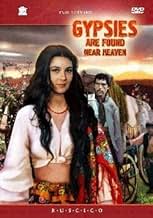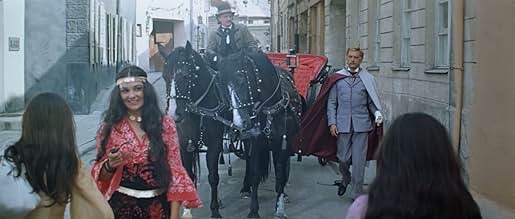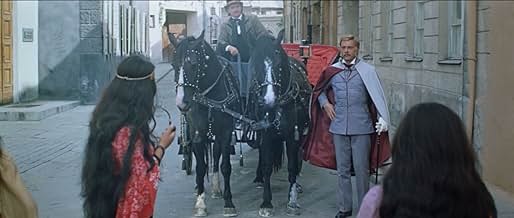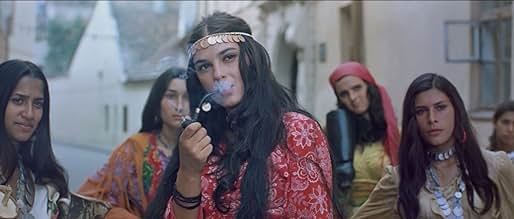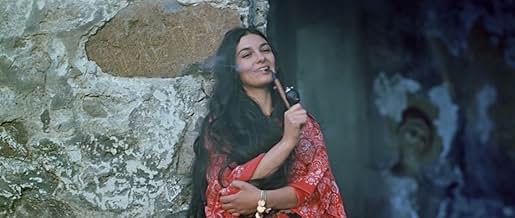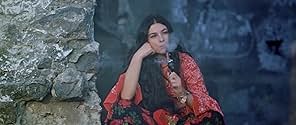VALUTAZIONE IMDb
7,3/10
1979
LA TUA VALUTAZIONE
Rada, una bella zingara, ammalia i cuori degli uomini. Zobar, un ladro di cavalli, cade sotto il suo incantesimo. Pur disposto a rinunciare alla sua libertà, rifiuta di abbandonare il suo or... Leggi tuttoRada, una bella zingara, ammalia i cuori degli uomini. Zobar, un ladro di cavalli, cade sotto il suo incantesimo. Pur disposto a rinunciare alla sua libertà, rifiuta di abbandonare il suo orgoglio.Rada, una bella zingara, ammalia i cuori degli uomini. Zobar, un ladro di cavalli, cade sotto il suo incantesimo. Pur disposto a rinunciare alla sua libertà, rifiuta di abbandonare il suo orgoglio.
- Regia
- Sceneggiatura
- Star
- Premi
- 1 vittoria e 1 candidatura in totale
Grigore Grigoriu
- Loiko Zobar
- (as Grigori Grigoriu)
Barasbi Mulayev
- Makar Chudra
- (as B. Mulayev)
Boryslav Brondukov
- Bucha
- (as Borislav Brondukov)
Vasyl Symchych
- Balint
- (as Vasili Simchich)
Recensioni in evidenza
Moldovan director Emil Loteanu's tenth feature film is probably his most famous one. "Gypsies Are Found Near Heaven" (1976) was a huge hit in the USSR, the most watched film in cinemas that year and also something that the critics fancied. The film, based on two stories by Maxim Gorki, is a depiction of wandering Gypsies in the turn-of-the-century Austria-Hungary. These people travel from one place to the next without staying long. They dance, they sing, and they fall in love.
Loteanu's film is very colorful and kind of other-worldly in its depiction of history. Though it is supposed to be taking place in 1900 or something, the gypsies at times look like 1970's hippies, and the look of the film is a tad anachronistic. It is not a narrative-driven film, but instead focuses on the atmosphere. There is a lot of gypsy music in it, which was historically interesting, and many of the songs were a joy to listen to. As a depiction of a disappearing way of life, this film works well. As a well-thought-out artistic experience, it's pretty messy. Some will like it more than others.
Loteanu's film is very colorful and kind of other-worldly in its depiction of history. Though it is supposed to be taking place in 1900 or something, the gypsies at times look like 1970's hippies, and the look of the film is a tad anachronistic. It is not a narrative-driven film, but instead focuses on the atmosphere. There is a lot of gypsy music in it, which was historically interesting, and many of the songs were a joy to listen to. As a depiction of a disappearing way of life, this film works well. As a well-thought-out artistic experience, it's pretty messy. Some will like it more than others.
This movie is a sweet melodrama about the life and the customs of gypsies in the past century. One of the main aspects that one may consider before watching this movie is the soundtrack, which contains several gypsy songs (original, with Romany words) flavored with some masterpieces of the well known Moldavian soundtrack composer Eugen Doga.
Unlike other movies, this film marches deep into the past revealing a world completely unknown to most of the present day individuals, an almost ancient time when gypsies were just a tribe of ill-behaved, rebellious people wandering from one place to another. Everything is covered with a haze of magic and archaic. It was a time when killing and getting killed for a fistful of gold or a horse were the order of the day, when people believed in sorcery and magic. It was a time when the traditions perpetuated orally, when "a capella" singing (rarely aided by a background violin or guitar) rather than big-band Bregovic-like events was the way to express one's grief or happiness. Listen to "I am dying mother" or "Phabaj" to understand what I mean!
Essentially the script tells an uncommon and passionately love story between a horse thief, Zobar, and a young gypsy witch, Rada. The script is a little bit unpolished making the impression of a "pink novel", but the music and the images (not to mention the beauty & talent of Svetlana Toma) balance quite well the not so very thick plot.
9/10 - for picturing so well a world lost to the ravages of time.
Unlike other movies, this film marches deep into the past revealing a world completely unknown to most of the present day individuals, an almost ancient time when gypsies were just a tribe of ill-behaved, rebellious people wandering from one place to another. Everything is covered with a haze of magic and archaic. It was a time when killing and getting killed for a fistful of gold or a horse were the order of the day, when people believed in sorcery and magic. It was a time when the traditions perpetuated orally, when "a capella" singing (rarely aided by a background violin or guitar) rather than big-band Bregovic-like events was the way to express one's grief or happiness. Listen to "I am dying mother" or "Phabaj" to understand what I mean!
Essentially the script tells an uncommon and passionately love story between a horse thief, Zobar, and a young gypsy witch, Rada. The script is a little bit unpolished making the impression of a "pink novel", but the music and the images (not to mention the beauty & talent of Svetlana Toma) balance quite well the not so very thick plot.
9/10 - for picturing so well a world lost to the ravages of time.
This film, known as "Satra" - a group of wandering gypsies - to the Romanians is definitely worth viewing. Based on a short novel by Gorki, it gives a snapshot of Gypsy life in the Far-Eastern part of the Habsburg Empire. Nevertheless, the film is a bit diminished by its 1970s-Soviet origin: many badly played-back songs, a soundtrack that tends to give a hippy-70s flavors to the Gypsy songs. I'm not so enthusiastic about the work of the composer who rather spoiled the Gypsy music than improved it. In this domain, Goran Bregovici keeps the lead. The RUSCICO DVD edition includes some interesting bonus though not very enlightening. Notice that the script was refused by the Moldovan Film Studios so that it was shot by the Moscow film studios.
beautiful songs, beautiful story. inspired performances. wise manner to present/remember old traditions and a page of gypsy's past who could be seeds for the present problems. sweet, romantic, remembering pages from Russian classic literature, it is a beautiful film, mixture of magic, love, faith and rules who seduce and impress, first form of Bregovic's universe and soap opera. it reflects the circle 's pieces of a community and have a cut couple as lead characters. and not the story remains after its end in memory but the music. old songs, fascinating dances, strange forms of courage, freedom in different definition, the dangerous games, the high price of honor, the love in its large forms. a film who could have many sides. because it is an ethnographic trip, a dark fairy tale, a romantic story, a film with a generous message, an aesthetic delight.
In the film there is no Romanian cast, all of the characters are played by Soviet actors. Moreover, with all of more or less authentic Gypsy features it has nothing to do with actual Gypsies. Gypsies here are metaphoric of some kind of people who follow different laws and rules than ordinary people; they are people who prefer the spiritual to the material, freedom to routine, passion to compromise, etc. With this approach most of the criticism expressed in some of the previous comments becomes irrelevant.
In the USSR there was no sex, it's true. There was passion and love -- love that burns.
Love that burns -- that's what the film tells about, and for this good cause all means is of use: transgression, tantra, pagan cults, dionysism, dark magic. This story can be named as well a Russian Carmen. Brilliant performance of Emil Lotjanu (director), Eugene Doga (music), Serguey Vronsky (photography), Svetlana Toma (awarded as the best Soviet actress of the year for the part of Rada), Grigore Grigoriu(Zobar), Borislav Brondukov (Buca) and others. Great art of a great civilization. Get it and enjoy seeing.
In the USSR there was no sex, it's true. There was passion and love -- love that burns.
Love that burns -- that's what the film tells about, and for this good cause all means is of use: transgression, tantra, pagan cults, dionysism, dark magic. This story can be named as well a Russian Carmen. Brilliant performance of Emil Lotjanu (director), Eugene Doga (music), Serguey Vronsky (photography), Svetlana Toma (awarded as the best Soviet actress of the year for the part of Rada), Grigore Grigoriu(Zobar), Borislav Brondukov (Buca) and others. Great art of a great civilization. Get it and enjoy seeing.
Lo sapevi?
- ConnessioniFeatured in Legendy mirovogo kino: Emil Loteanu
- Colonne sonoreNane Tsokha
Performed by Alyona Buzylyova
I più visti
Accedi per valutare e creare un elenco di titoli salvati per ottenere consigli personalizzati
- How long is Queen of the Gypsies?Powered by Alexa
Dettagli
- Data di uscita
- Paese di origine
- Lingua
- Celebre anche come
- Queen of the Gypsies
- Luoghi delle riprese
- Azienda produttrice
- Vedi altri crediti dell’azienda su IMDbPro
- Tempo di esecuzione
- 1h 41min(101 min)
- Colore
- Proporzioni
- 2.20 : 1
Contribuisci a questa pagina
Suggerisci una modifica o aggiungi i contenuti mancanti

